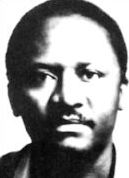Okot p'Bitek

Okot p'Bitek (7 June 1931 – 20 July 1982) was a Ugandan poet, who achieved wide international recognition for Song of Lawino, a long poem dealing with the tribulations of a rural African wife whose husband has taken up urban life and wishes everything to be westernised. Song of Lawino was originally written in the Acholi language, and self-translated to English, and published in 1966. It was a breakthrough work, creating an audience amongst anglophone Africans for direct, topical poetry in English; and incorporating traditional attitudes and thinking in an accessible yet faithful literary vehicle. It was followed by the pendant Song of Ocol (1970), the husband's reply.
The East African Song School or Okot School poetry is now an academic identification of the work following his direction, also popularly called "comic singing": a forceful type of dramatic verse monologue rooted in traditional song and phraseology.
Life
This section needs additional citations for verification. (November 2016) |
Okot p'Bitek was born in Gulu, in the North Uganda grasslands. His father Jebedayo Opi was a schoolteacher, his mother Lacwaa Cerina was a traditional singer. His background was Acholi, and he wrote first in Lwo, one of the Western Nilotic languages.
He was educated at Gulu High School, then King's College, Budo, and later at universities in the United Kingdom. At school he was noted as a singer, dancer, drummer and athlete; he composed and directed an opera while at college.
He travelled abroad first as a player with the Ugandan national football team, in 1958. At this point he gave up on football as a possible career, staying on in Britain; he studied education at the University of Bristol, and then law at the University of Wales, Aberystwyth. He then took a B.Litt. degree in social anthropology at the University of Oxford, with a 1963 dissertation on Acholi and Lango traditional cultures.
According to George Heron he lost his commitment to Christian belief during these years. This had major consequences for his attitude as a scholar of African tradition, which was by no means accepting of the general run of earlier work, or what he called "dirty gossip" in relation to tribal life. His character Lawino also speaks for him, in some places, on these matters.
He wrote an early novel, Lak Tar Miyo Kinyero Wi Lobo (1953), in Lwo, later translated into English as White Teeth. It concerns the experiences of a young Acholi man moving away from home, to find work and so a wife. He organised an arts festival at Gulu, and then at Kisumu. Subsequently he taught at Makerere University and then was Director of Uganda's National Theatre.
He became unpopular with the Ugandan government, and took teaching posts outside the country. He took part in the International Writing Program at the University of Iowa in 1969. He was at the Institute of African Studies of University College, Nairobi from 1971 as a senior research fellow and lecturer, with visiting positions at University of Texas at Austin and University of Ife in Nigeria in 1978/9. He remained in exile during the regime of Idi Amin, returning in 1982 to Makerere University, to teach creative writing.
Apart from his poetry and novels, he also took part in an ongoing debate about the integrity of scholarship on traditional African religion, with the assertion in African Religions in Western Scholarship (1971) that scholars centred on European concerns were "intellectual smugglers". His point, aimed partly at Africans who had had a training in Christian traditions, was that it led to a concentration on matters distant from the actual concerns of Africans; this has been contested by others. He was an atheist.[1]
He died in Kampala of a stroke in 1982. He is survived by daughters Agnes Oyella, Jane Okot p'Bitek, who wrote a Song of Farewell (1994), Olga Okot Bitek Ojelel and Cecilia Okot Bitek who work as nurses, Juliane Okot Bitek who writes poetry, and a son George Okot p'Bitek, who is a Teacher in Kampala. Olga, Cecilia, and Juliane all live in Vancouver, British Columbia, Canada. In 2004 Juliane was the recipient of an award in the Commonwealth Short Story Contest for her story "Going Home". These are the daughters of his wife Caroline.[2]
Works
- Lak Tar Miyo Kinyero Wi Lobo (1953); novel in Luo, English translation White Teeth
- Song of Lawino: A Lament (1966); poem, translation of a Luo original Wer pa Lawino
- The Defence of Lawino (1969); alternate translation by Taban Lo Liyong
- Song of Ocol (1970); poem, written in English
- Religion of the Central Luo (1971)
- Two Songs: Song of a Prisoner, Song of Malaya (1971); poems
- African Religions in Western Scholarship (1971, Nairobi)
- Africa's Cultural Revolution (1973); essays
- Horn of My Love; translations of traditional oral verse. London: Heinemann Educational Books, 1974. ISBN 0-435-90147-8
- Hare and Hornbill (1978) folktale collection
- Acholi Proverbs (1985)
- Artist, the Ruler: Essays on Art, Culture and Values (1986)
- Modern Cookery
Further reading
- Lara Rosenoff Gauvin, "In and Out of Culture: Okot p’Bitek’s Work and Social Repair in Post-Conflict Acoliland". Oral Tradition 28/1 (2013): 35-54. (available online)
- George A. Heron, The Poetry of Okot p'Bitek (1976)
- Gerald Moore, Twelve African Writers (1980)
- Monica Nalyaka Wanambisi, Thought and Technique in the Poetry of Okot p'Bitek (1984)
- Molara Ogundipe-Leslie and Ssalongo Theo Luzuuka (eds), Cultural Studies in Africa : Celebrating Okot p'Bitek and Beyond (1997 Symposium, University of Transkei)
- Samuel Oluoch Imbo, Oral Traditions As Philosophy: Okot P'Bitek's Legacy for African Philosophy (2002)
References
- ^ Communication and Conversion in Northern Cameroon: The Dii People and Norwegian Missionaries, 1934–1960, p. 118.
- ^ Jane Musoke-Nteyafas, "One on One with Juliane Bitek, Author, Poet and Daughter of the Legendary Okot p'BiteK", AfroLit, 18 August 2008.
